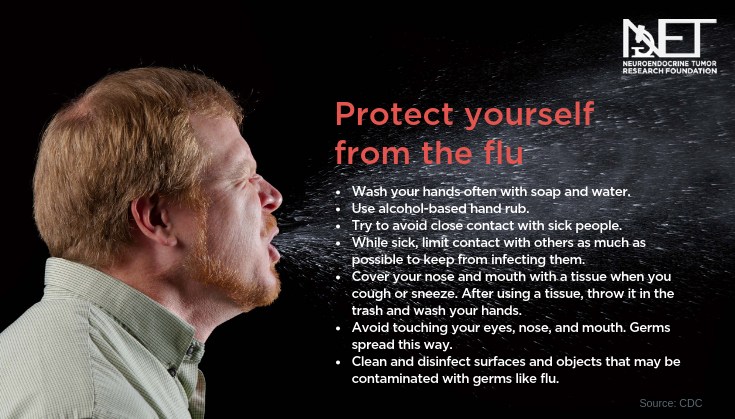 Living with cancer increases your risk for complications from influenza (“flu”). If you have cancer now, have had cancer in the past, or live with someone who has a cancer history, it’s important to protect yourself and your family from the flu.
Living with cancer increases your risk for complications from influenza (“flu”). If you have cancer now, have had cancer in the past, or live with someone who has a cancer history, it’s important to protect yourself and your family from the flu.
The flu vaccine
The Centers for Disease Control recommends cancer patients, cancer survivors, and their families be vaccinated against seasonal flu by the end of October. Don’t delay. Your body needs a few weeks to develop the antibodies that protect you against the flu.
You may face increased risks for the flu
Cancer treatment can lower your ability to fight infection from viruses and bacteria. Some medications can also affect how a flu vaccine works. That’s why it’s important that you talk to your doctor about which type of flu vaccine is best for you. (You may need to avoid a nasal spray vaccine with a live virus.)
Many people who are at increased risk for flu are also at increased risk for pneumococcal disease. It’s a good idea to also ask your doctor if pneumococcal shots are also needed.
Make a plan with your doctor about what to do if you get sick. The plan should include when you should call your doctor and how to get a prescription for antiviral medication quickly if needed.
Lookout for signs of the flu
Be on the lookout for signs of the flu. Keep a working thermometer in a convenient location at home. If you feel warm, feverish, or chilled, take your temperature. It’s important for people with cancer to notify their doctor immediately if they get a fever.
Symptoms of the flu
- Fever or feeling feverish/chills
- Cough
- Sore throat
- Runny or stuffy nose
- Muscle or body aches
- Headaches
- Fatigue (tiredness)
- Some people may have vomiting and diarrhea
Serious complications from the flu can affect those with cancer according to the American Society of Clinical Oncology’s patient information website, including:
- Dehydration
- Bronchitis or pneumonia
- Worsening lung and heart problem

